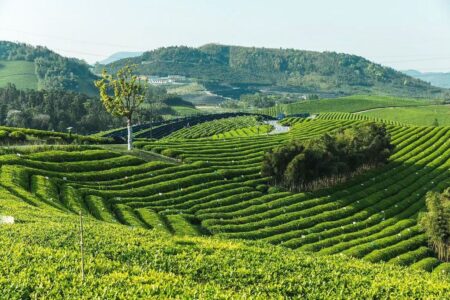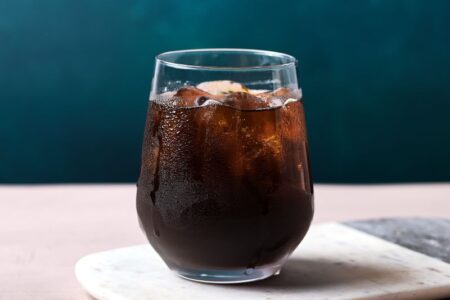Peet’s Coffee transitions to 100 per cent water processing for its decaf coffees

Peet's Coffee's revamped decaffeinated line features organic and single-origin coffee. Image: Peet's Coffee
Peet’s Coffee has fully transitioned to water processing across its entire line of decaffeinated roasted beans, K-Cup pods, and hand crafted decaf coffee beverages. This process is chemical-free and naturally removes caffeine while ensuring the integrity, taste, and quality of the coffee beans for an optimal sipping experience. By E Edward ‘Ted’ Hoyt.
Already enjoying an 11 per cent jump in its decaffeinated coffee sales in 2021, Emeryville, California-based specialty roaster Peet’s Coffee announced in January it had fully transitioned its entire portfolio of decaffeinated craft-roasted coffee beans, pods, and in-store beverages to water processing methods.
“We’ve been working on it for a really long time,” explained Doug Welsh, vice president of coffee at Peet’s who serves both as roast master and member of the company’s coffee buying team. A chief enabler for the move has been the steadily rising bar in quality among water process decaffeinators, as well as increased processing capacity that has made it feasible for Peet’s to move its entire decaffeinated product portfolio (in Peet’s coffee bars, its website and its retail offerings) over to the water process.
“Over a long period of tasting coffee every day – in my case over the last 28 years – we feel very strongly that several of the water process decaffeinators are on a quality par with the best decaffeination in the world, and that’s something that we’ve been tracking over some years,” he said. “We’re really glad that it’s come to fruition.”
The transition was actually completed about a year ago, but Peet’s Coffee delayed the announcement to allow existing non-water process product to fully work its way through channels, avoiding what Welsh described as potentially mixed messages. “We waited until long after we hope anyone is still keeping Peet’s Coffee in their cupboard,” he added.
Welsh sees the achievement as an opportunity to shift the discussion from the technical side, and instead focus more on the core philosophy established by company founder Alfred Peet in 1966—sourcing the best beans possible, and sensory-roasting them by hand in small batches to deliver a ‘great cup of coffee’, which is the bottom line for customers. “You can have it with caffeine or without, but you’re going to have a great cup of coffee, and that’s been our philosophy from the very beginning,” said Welsh of all Peet’s coffees.
“One of the great things about going to all water process for us,” he continues, “is to end the distraction about whether one method is better than another, or healthier than another.” From Welsh’s standpoint, the customer isn’t super interested in the details of the process. “They want us to take care the technology, the shipments, the roasting,” he says, but clearly the chemical-free natural water process resonates powerfully among Peet’s premium decaf customers.
“I think we have good signals from our customers that it’s something that they want,”Welsh continues. “I think there’s a general trend towards simplification of ingredients, cleaner ingredients. We see that in a lot of the beverages that we make and the ingredients we use for other things, and of course, our most important ingredient, coffee.”
Packaging updates identifying all Peet’s Coffee’s decaffeinated products as “natural water process” is ongoing but is expected to be complete by late spring.
“We think this is a great method for a great cup of coffee,” Welsh offers, “and that’s the message that we’re going to go forward with.”
Since Peet’s sources all of its own coffees – from 24 different countries around the world – the company chose to work with several top-quality decaffeination companies, geographically dispersed to provide ‘multiple pathways’ from source to the company’s roasting facility in Alameda, Calif. “Logistics – especially these days –are quite fraught,” Welsh noted, “so we want to have as many different routes right now as we possibly can to make sure that we don’t run short.” All three water process companies the company is partnering with are certified organic, among numerous other standards.
Peet’s works with Descamex (Descafeinadores Mexicanos SA de CV) in Córdoba, Mexico, located closest to the coffees it sources from Central and Latin America. Explains Daniel Robles Muguira, export vice president at Descamex, “Our main goal is to offer a great tasting decaf coffee so no one misses the amazing flavour and aroma.” The firm, which was the first decaffeinator established in Latin America, has been continually honing its own water process method for over 40 years, increasingly embracing roasters sourcing their own beans.
“We’re really glad to also be working with Coffeinco, which has a new water process capacity in Germany,” Welsh continued. “That’s another transit route, coming across from the Atlantic side—great coffee, great operator, longtime partner, another great option.” Based in Bremen, Coffeinco (Coffein Compagnie GmbH & Co KG) is one of the most established decaffeinators in the industry, founded in 1931 specifically to increase the quality of decaffeinated coffee. Last year, it brought a new water process facility online at its Bremen headquarters.
The latest decaffeinator to be working with Peet’s Coffee is Swiss Water Decaffeinated Coffee Inc in Vancouver, Canada, which Welsh noted logistically broadens the geographic spread of its partner pool, provided additional logistical leeway. That said, the baseline criteria for any of Peet’s decaffeination partners is the ability to provide extraordinary quality. “They do a great job,” Welsh said of Swiss Water, “and it’s a colossal advantage.”
Like other water process decaffeinators which have experienced an increased demand for contract processing of top-quality specialty grade coffees, Swiss Water doubled down on its own quality focus back in 2010 and is today proud of its ability to effectively preserve the inherent characteristics of coffees through its water process.
Doing decaf differently
Welsh is quick to reiterate that there is no secret to what makes great decaf coffee: it is selecting great coffees to decaffeinate in the first place.
“That’s the core of our philosophy at Peet’s and the difference at Peet’s,” he stressed. “Our whole objective is to provide our customers with great cups of coffee. In a way, we would like to be agnostic as to format or even caffeine or no caffeine. We just want a great cup of coffee and the real key to that is ‘quality in.’”

Peet’s transitioned its entire decaffeinated coffee range to the water process method. Image: Peet’s Coffee
While the purchase of stock lots among mainstream decaf brands remains common place among major brands, specialty roasters seeking decaffeination services for the premium-grade coffees they source themselves has helped effectively raised the quality of their decaf products on par with their regular caffeine products.
“We will always be total decaffeinators,” said Welsh of Peet’s Coffee. “We select the coffee,” citing two crucial reasons. First, sourcing top quality beans is what put the company on the map in the first place, and second, sensory-based craft roasting is applied to all beans that Peet’s roasts, whether the caffeine has been removed or not, and that requires an intimate understanding of each varietal and where it came from.
“I just don’t see how I would ever let anyone choose my coffees for me,” Welsh admitted. “That’s part of the art.”
Welsh goes so far as to say that the general philosophy in the trade towards decaf has been rather backward. “We all have to concede that there is some loss of flavour, some loss of aroma, texture,” in the decaffeination process, he said. “The whole idea in decaffeination, or offering a great cup of decaf, is to minimise that… A lot of people, their philosophy is, ‘It’s just decaf.’” Welsh prefers to keep the focus on the customer at the end of the process where, whether by necessity or increasingly by choice in choosing decaf, those customers “want to drink great coffee too.”
For Welsh, that’s the last place anyone should skimp on quality. “Since you are going to lose a little bit of flavour and body,” in the decaffeination process, “you want to start with the max. You want to select the highest quality coffee that you can find to use in decaf.”
Then there’s the roasting. “Craft in roasting decaf is really important because it roasts quite differently,” Welsh explains.The properties are quite different, and a craft roaster knows that and reacts to it in drawing out the best flavours. You might think it’s exactly the same, but decaffeinated coffee does behave slightly differently in the roasting process, and you really want to be sensitive to that and it takes a different technique to develop the best flavour.”
Welsh attributes last year’s jump in decaf sales at Peet’s to its conservatively expanded selection, which included an organic coffee, a Latin American blend called Terrena, which he said was a “great boost.” Decafs typically account for about 10 to 15 per cent of a roaster’s sales in the United States, so portfolios are by logistical necessity, smaller than their full range of offerings. Nonetheless, Welsh said Peet’s offers a variety of decafs in a variety of formats, including Mocca Java, “a really nice” blend of Java and Ethiopian Mocca coffees; a Sumatra single origin; a French Roast; the House Blend Decaf; and the company’s flagship coffee, Major Dickason’s Blend, offered in a decaffeinated form.
“We want to talk about those flavours, those cups, those experiences,”Welsh concluded. “Making [decaf coffee] more available in more formats and offering different, more interesting flavour choices was what drove [the line’s] expansion.”
- E Edward ‘Ted’ Hoyt has more than two decades of experience as a trade magazine editor and freelance writer, authoring many articles in the premium coffee, spirits and cigar industries, among others.




The Tea & Coffee Trade Journal stands as a venerable beacon in the world of beverages, offering a deep dive into the intricacies of the tea and coffee industries. It serves as a crucial platform for industry professionals, enthusiasts, and scholars alike, providing a rich tapestry of articles that span from detailed market analyses to emerging trends and innovations in tea and coffee production. The journal not only enriches its readers’ knowledge but also fosters a sense of community among those passionate about these beloved beverages. By highlighting the latest research, sharing expert insights, and exploring the cultural significance of tea and coffee, the Tea & Coffee Trade Journal continues to be an invaluable resource that contributes significantly to the global conversation around these timeless drinks.